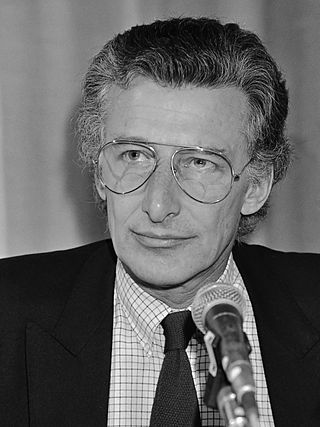
Harry Kurt Victor Mulisch was a Dutch writer. He wrote more than 80 novels, plays, essays, poems, and philosophical reflections. Mulisch's works have been translated into 38 languages so far.

Willem Frederik Hermans was a Dutch author of poetry, novels, short stories, plays, as well as book-length studies, essays, and literary criticism. His most famous works are The House of Refuge, The Darkroom of Damocles, and Beyond Sleep.

Arnon Yasha Yves Grunberg is a Dutch writer of novels, essays, and columns, as well as a journalist. He published some of his work under the heteronym Marek van der Jagt. He lives in New York. His work has been translated into 30 languages. In 2022 he received the PC Hooftprijs, a Dutch literary lifetime achievement award. His most acclaimed and successful novels are Blue Mondays and Tirza. The New York Times called the latter ‘grimly comic and unflinching (…) while not always enjoyable, it is never less than enthralling’. Frankfurter Allgemeine Zeitung described him as ‘the Dutch Philip Roth’.

Tom Lanoye was born on 27 August 1958 in the Belgian city Sint Niklaas. He is a novelist, poet, columnist, screenwriter and playwright. He is one of the most widely read and honoured authors in his language area, and makes regular appearances at all the major European theatre festivals.
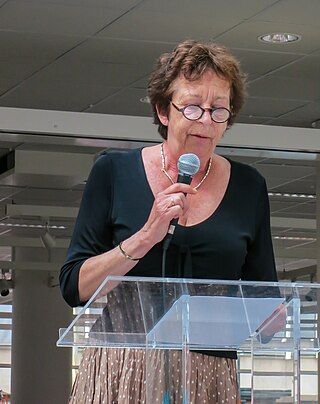
Renate Maria Dorrestein was a Dutch writer, journalist and feminist. She started working as a junior journalist for the Dutch magazines Libelle and Panorama. During the period 1977 - 1982 she published in Het Parool, Viva, Onkruid and Opzij. Dorrestein published her first novel (Buitenstaanders) in 1983. Her sister's suicide had a great influence on her books. Dorrestein won the Annie Romein prize in 1993 for her complete body of work. A lot of Dorrestein's books were translated, and they were sold in 14 countries.
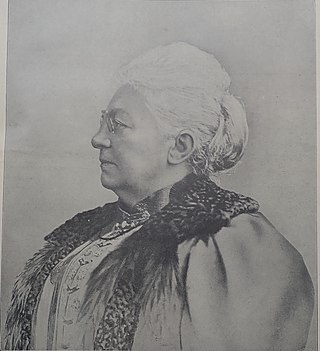
Virginie (Marie) Loveling was a Flemish author of poetry, novels, essays and children's stories. She also wrote under the pseudonym W. E. C. Walter. She did write sentimentally early in her career but her later novels dealt with difficult subjects directly.
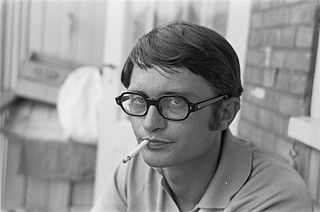
Remco Campert was a Dutch author, poet and columnist.
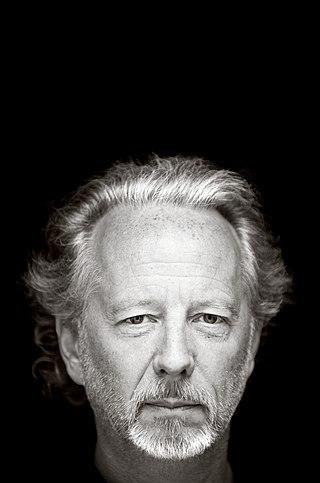
Stefan Hertmans is a Flemish Belgian writer. He was head of a study centre at University College Ghent and affiliated researcher of the Ghent University. He won the Ferdinand Bordewijk Prijs in 2002 for the novel Als op de eerste dag.
Willem Maurits Roggeman is a Belgian poet, novelist and art critic.

Cyriel Paul Coupé (1918–1998) was a Belgian diocesan priest, teacher, writer and poet, also known by the pseudonym Anton van Wilderode.
Gerrit Krol was a Dutch author, essayist and writer.

Michaël Henricus Gertrudis (Michiel) van Kempen is a Dutch writer, art historian and literary critic. He has written novels, short stories, essays, travel literature and scenarios. He was the compiler of a huge range of anthologies of Dutch-Caribbean literature and wrote an extensive history of the literature of Suriname, in two volumes.

Gerrit Jan Komrij was a Dutch poet, novelist, translator, critic, polemic journalist and playwright. He rose to prominence in the early 1970s, writing poetry that sharply contrasted with the free-form poetry of his contemporaries. He acquired a reputation for his prose in the late 1970s, writing acerbic essays and columns often critical of writers, television programs, and politicians. As a literary critic and especially as an anthologist he had a formative influence on Dutch literature: his 1979 anthology of Dutch poetry of the 19th and 20th centuries, reformed the canon, and was followed by anthologies of Dutch poetry of the 17th and 18th centuries, of Afrikaans poetry, and of children's poetry. Those anthologies and a steady stream of prose and poetry publications solidified his reputation as one of the country's leading writers and critics; he was awarded the highest literary awards including the P. C. Hooft Award (1993), and from 2000 to 2004, he was the Dutch Dichter des Vaderlands. Komrij died in 2012 at age 68.
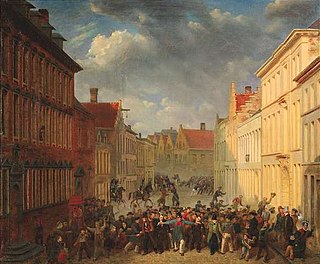
Orangism was a political tradition in Belgium that supported its reintegration into the short-lived United Kingdom of the Netherlands (1815–1830) under the rule of the Dutch House of Orange. It existed principally in the 1830s and 1840s.

Johannes Jacobus Willebrordus "Joost" Zwagerman was a Dutch writer, poet and essayist. Among his teachers was the novelist Oek de Jong.

Tonnus Oosterhoff is a Dutch poet and writer.
LGBT writers in the Dutch-language area are writers from de Lage Landen, that is Flanders and the Netherlands,

Astrid Heligonda Roemer is a Surinamese-Dutch writer and teacher. The Dutch-language author has published novels, drama and poetry, and in December 2015 was announced as the winner of the P. C. Hooft Award, considered the most important literary prize in the Netherlands and Belgium, which was presented in May 2016.
Jan Koopmans was a Dutch theologian, best known for his works De Nederlandsche Geloofsbelijdenis (1939) and Wat wij wel en wat wij niet geloven (1941).

Johanna Maria Jelles (Hannemieke) Stamperius was a Dutch feminist writer and critic. She published literary criticism and feminist scholarship under her own name, and literary work under the pseudonyms Hannes Meinkema. She used the pseudonym Justa Abbing to write four other novels, mostly thrillers.
















